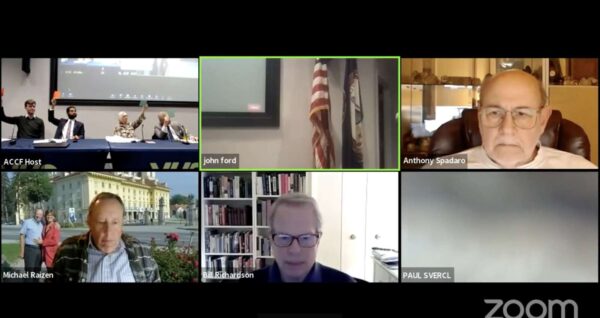
A battle over how to improve public confidence in county government has driven a wedge between two large community organizations in Arlington.
The Arlington branch of the NAACP is leaving the Arlington County Civic Federation after a bitter battle over two resolutions intended to recommit the local government to the “Arlington Way.”
The clash came to a head last night (Wednesday) when delegates to the federation of civic groups voted 75-32 for a resolution, introduced by some former CivFed presidents, that included harsh criticism of county processes.
The NAACP had proposed a milder substitute resolution, focused on improving public engagement.
The tussle is downstream of two shifts in Arlington. The first occurred amid the racial reckoning of 2020, which resulted in CivFed pledging to be more diverse. The second occurred as Missing Middle, the proposal to allow greater density in single-family home neighborhoods, laid bare issues many residents say pervade civic engagement.
“A few years ago, the NAACP joined CivFed in a good faith attempt to assist the organization evolve, transform and grow; however, our organizational mission, vision, and values don’t seem to align well,” NAACP President Mike Hemminger said in an email shared with ARLnow. “We wish the CivFed the very best in the future.”
He said the NAACP has appreciated the chance to engage with members in recent years.
“Our sincere prayer is that your organization will one day accomplish the diversity, equity, inclusion and sense of belonging that so many are craving from leader organizations in the community,” he said.
CivFed President John Ford said he was disappointed to learn of the NAACP’s decision last night, especially after 98% of members voted for its admission to the federation in 2020.
“CivFed and NAACP continue to share many goals, and the many associations and warm, respectful relationships we have built with our NAACP colleagues will endure,” he said in a statement. “We hope they may seek to rejoin us in the future. And I am certain that the two organizations will continue to collaborate in many areas for the benefit of all Arlingtonians.”
While there is one overt reference to Missing Middle, long-standing criticisms of this zoning amendment permeate the text and its 100-plus footnotes, including one resolution.
It urges the County Board to adopt a policy “preventing implementation of plans, policies or projects (new major initiatives or revisions) in the absence of a thorough and data-supported analysis of the potential and cumulative impacts.”
The NAACP instead urged the county to invest “more resources in comprehensive planning and developing a more sophisticated, data-driven toolkit for anticipating, addressing, and communicating likely impacts from County policies.”
The original resolution ruffled feathers of other community groups, too, including YIMBYs of Northern Virginia, a group advocating for more housing that has been vocal in the push for Missing Middle housing in Arlington.
In its own statement, the group said an appendix to CivFed’s motion is a “100-page laundry list of personal attacks, vague accusations of dismissiveness by County staff and Board members, unfounded insinuations of conflicts of interest by Advisory Group appointees, plus multiple direct attacks on YIMBYs of Northern Virginia.”
“The authors may say that their goal is to be more inclusive of all opinions, however the authors of the Civic Federation resolution continually insinuate that the views of YIMBYs and renters aren’t as valid as others,” group spokesman and former County Board candidate Adam Theo said. “If those who are opposed to our mission of growth, prosperity, and solving Arlington’s housing crisis want to attack us, they should at least have the decency to get basic facts about us right.”
Despite the resolution calling for an improvement in county governance, it suffered from its own internal challenges. That included its approval being delayed from last month and nearly being delayed again last night.
ARLnow is told one member challenged the length of time the resolution was advertised, briefly causing confusion about whether members would vote on it at all. Meanwhile, the authors of the two resolutions met in “work-session style” meetings that apparently other members did not know about.
“Both these groups met without telling us, involving anyone else except them,” meeting attendee Bernie Berne said. “I know it took a long time… there’s a reason for this… Over the past month, people took positions, didn’t invite people or tell people about it. This is exactly what we’re saying the County Board shouldn’t be doing.”

